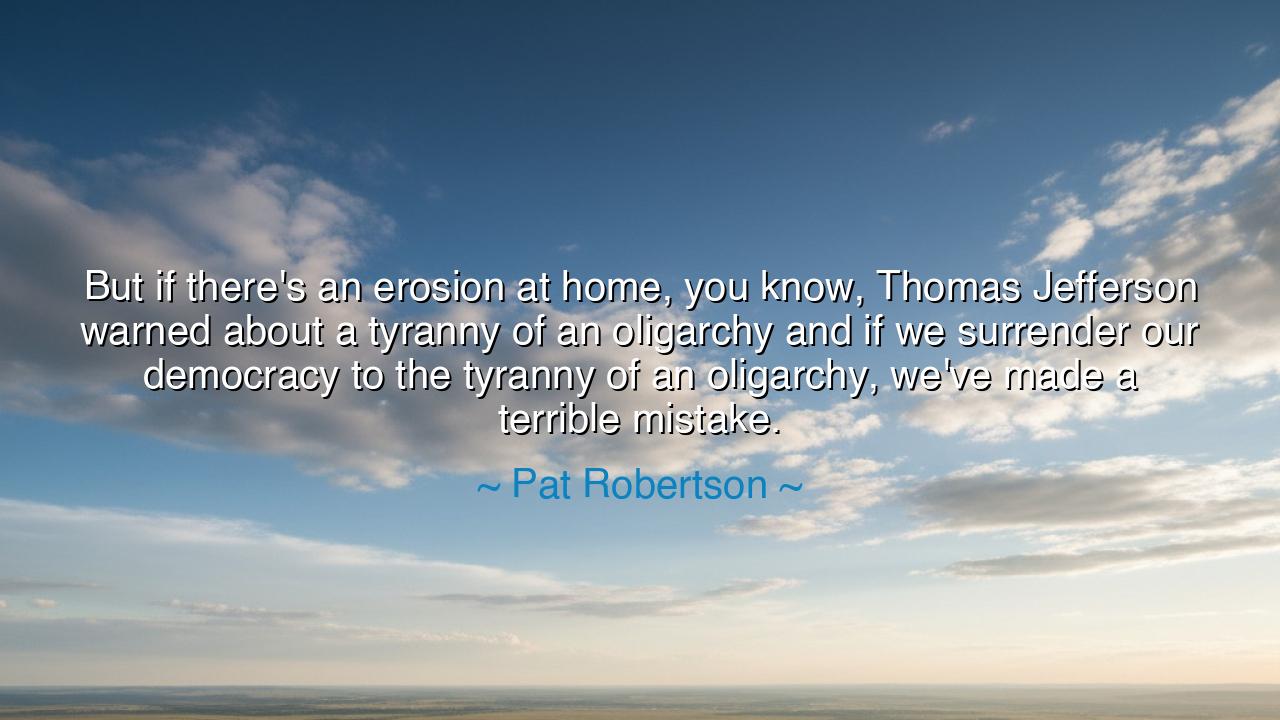
But if there's an erosion at home, you know, Thomas Jefferson
But if there's an erosion at home, you know, Thomas Jefferson warned about a tyranny of an oligarchy and if we surrender our democracy to the tyranny of an oligarchy, we've made a terrible mistake.






In the solemn words of Pat Robertson, we hear both a warning and a lament: “But if there’s an erosion at home, you know, Thomas Jefferson warned about a tyranny of an oligarchy, and if we surrender our democracy to the tyranny of an oligarchy, we’ve made a terrible mistake.” These words, though spoken in the modern age, ring with the eternal weight of ancient prophecy. They speak of the slow decay not of stone walls or mighty armies, but of the moral foundations that hold a people together. When a nation forgets the sacred duty of vigilance, when the many yield their voice to the few, freedom fades not with a roar, but with a whisper.
Robertson’s echo of Jefferson recalls the ancient covenant of liberty — that fragile bond between people and power. Jefferson, a son of revolution and philosopher of freedom, warned that when wealth and influence gather into too few hands, the republic begins to rot from within. The Greeks of old understood this peril. Aristotle himself wrote that every democracy carries within it the seed of its own corruption — that if virtue fails, the strong will devour the weak, and equality will perish beneath the weight of greed. So Robertson’s words, though framed in modern fear, carry the timbre of timeless truth: that the greatest threat to a nation often rises not from without, but from within its own heart.
The erosion at home he speaks of is not merely political — it is spiritual. It is the erosion of integrity, of civic duty, of faith in the common good. When citizens grow weary of self-governance, when comfort becomes dearer than principle, then the soil of democracy begins to crumble. The ancients would have called this decay hubris — the arrogance of a people who believe themselves immune to decline. History shows that no empire, no republic, no kingdom is spared when its people trade virtue for ease. Rome, once a beacon of law and order, fell not to foreign armies but to its own complacency. Bread and circuses dulled its courage; luxury rotted its spirit. And from its ashes rose emperors — oligarchs in all but name — who ruled over what had once been free.
So too, in every age, the tyranny of an oligarchy creeps in when the people slumber. It does not arrive with chains and swords, but with promises of security, prosperity, and convenience. The rulers smile, the citizens applaud, and slowly, almost tenderly, the chains are fastened. This is the great tragedy of freedom — that it must be guarded, even against the soft hands that claim to protect it. The tyranny Robertson warns of is subtle: not a storm of conquest, but a slow suffocation, where the voice of the many fades beneath the power of the few.
Yet, there is still hope, for the lesson is not despair but awakening. Jefferson’s warning was not meant to curse the future, but to rouse it. Every generation must renew the covenant of liberty — to question power, to speak truth, to defend the weak. The ancients held that the health of a nation depends upon the virtue of its citizens. When people are honest, humble, and vigilant, no tyrant can rule them; when they grow selfish and silent, they forge their own chains. Thus, democracy is not a gift to be inherited, but a fire to be tended — passed from heart to heart, generation to generation.
Consider the story of Solon of Athens, the wise lawgiver who reformed the city to prevent tyranny. He saw that wealth had corrupted the nobles and despair had broken the poor. Instead of surrendering to chaos, he crafted laws to restore balance, giving each class a voice in governance. His wisdom preserved Athens for a time, proving that freedom can endure when courage and fairness prevail. But when later generations forgot his example, tyranny returned — as it always does when vigilance fades.
Let this be the lesson for our time: freedom erodes when we cease to protect it. The fight for justice, equality, and truth is not a battle of swords, but of souls. Do not surrender your conscience to the powerful, nor your will to the comfortable. Speak, even when silence is easier. Question, even when obedience is rewarded. For the cost of liberty is eternal vigilance — a price that only the brave will pay.
Therefore, remember this teaching: a democracy dies not when the tyrant rises, but when the people no longer care. Keep your heart awake. Cherish truth more than wealth, virtue more than victory. Teach your children to value justice above comfort. For if we stand firm against the creeping tide of oligarchy, we may yet preserve the flame that our ancestors kindled — the sacred flame of freedom that lights the path of all who choose to live as free souls, not as subjects. And in that steadfastness, the words of both Jefferson and Robertson will endure — not as warning, but as triumph.






AAdministratorAdministrator
Welcome, honored guests. Please leave a comment, we will respond soon